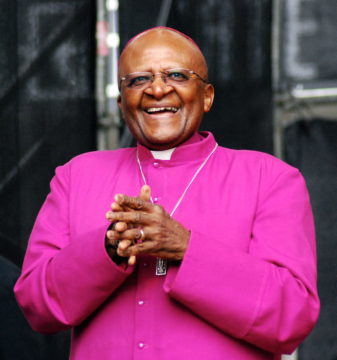David Rovics in Counterpunch:
 This may sound either arrogant or forgetful, but I could not possibly remember the number of times I was in the same room or at the same protest as Desmond Tutu. And the main reason I know he was there is because I was there listening to him speak, often from a distance of not more than two meters or so. I say this not to associate myself with the great man — though I’ll forgive you for thinking I’m a terrible, narcissistic name-dropper — but just to be sure we all know this all really happened, because I saw and heard it.
This may sound either arrogant or forgetful, but I could not possibly remember the number of times I was in the same room or at the same protest as Desmond Tutu. And the main reason I know he was there is because I was there listening to him speak, often from a distance of not more than two meters or so. I say this not to associate myself with the great man — though I’ll forgive you for thinking I’m a terrible, narcissistic name-dropper — but just to be sure we all know this all really happened, because I saw and heard it.
It seems very important to mention, because of the way this man is already being remembered by the world’s pundits and politicians. As anyone could have predicted, Tutu is being remembered as the great opponent of apartheid in his native South Africa, who was one of the most recognized and most eloquent leaders of the anti-apartheid struggle there, for most of his adult life.
Being a leader in the movement to end apartheid in South Africa was probably the greatest achievement of the man’s life work, and it should come as a surprise to no one that this is the focus of his many obituaries, along with the Nobel he was awarded in 1984. After Martin Luther King, Jr.’s assassination, he was remembered by the establishment in much the same way, as a leader of the movement against apartheid in the US. The fact that he had become one of the most well-known and well-loved voices of the antiwar movement in the United States and around the world at the time of his death has largely been written out of the history books, a very inconvenient truth.
But as with Martin Luther King, many of the same political leaders commemorating Tutu today would have been unlikely to mention him a day earlier, lest Tutu take the opportunity to speak his mind. This is certainly why he was not invited to commemorate his friend and comrade, Nelson Mandela, at Mandela’s funeral eight years ago.
More here.
